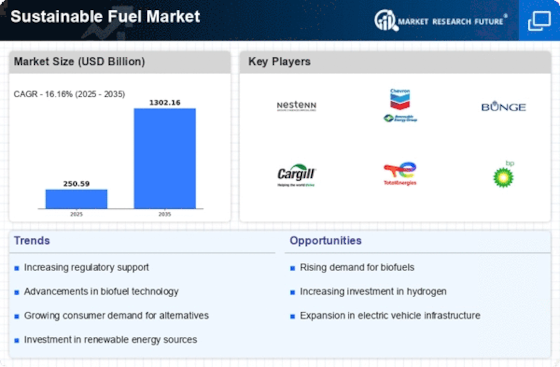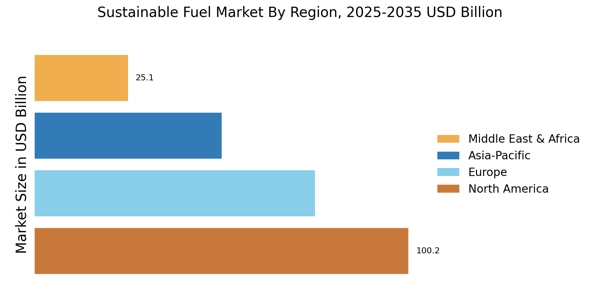Government Policies and Incentives
The Sustainable Fuel Market is significantly influenced by government policies and incentives aimed at reducing carbon emissions and promoting renewable energy sources. Many countries have implemented mandates for blending renewable fuels with traditional fossil fuels, thereby creating a stable demand for sustainable fuels. For instance, the Renewable Fuel Standard in the United States has established ambitious targets for biofuel production. Additionally, financial incentives such as tax credits and grants for sustainable fuel projects are becoming more prevalent. These policies not only encourage investment in the sector but also stimulate innovation and competition among producers. As a result, the market is likely to see an increase in sustainable fuel adoption, driven by supportive regulatory frameworks.
Corporate Sustainability Initiatives
The Sustainable Fuel Market is increasingly shaped by corporate sustainability initiatives as businesses recognize the importance of reducing their carbon footprints. Many corporations are setting ambitious sustainability goals, including commitments to transition to renewable energy sources. This trend is particularly evident in sectors such as transportation and logistics, where companies are exploring sustainable fuel options to meet their environmental targets. Reports suggest that a growing number of corporations are investing in partnerships with sustainable fuel producers to secure a reliable supply of renewable fuels. This corporate shift not only enhances the market for sustainable fuels but also fosters innovation and collaboration within the industry, potentially leading to new advancements and solutions.
Rising Consumer Awareness and Demand
The Sustainable Fuel Market is witnessing a notable increase in consumer awareness regarding environmental issues and the need for sustainable energy solutions. As consumers become more informed about the impacts of fossil fuels on climate change, there is a growing demand for cleaner alternatives. Surveys indicate that a significant percentage of consumers are willing to pay a premium for sustainable fuel options, reflecting a shift in purchasing behavior. This trend is further supported by the automotive sector, where manufacturers are increasingly offering vehicles compatible with biofuels and other sustainable fuels. The rising consumer demand is likely to drive market growth, as companies respond to this shift by expanding their sustainable fuel offerings.
Investment in Renewable Energy Infrastructure
The Sustainable Fuel Market is benefiting from increased investment in renewable energy infrastructure, which is essential for the production and distribution of sustainable fuels. Investments in bio-refineries and advanced fuel production facilities are on the rise, driven by both private and public sector funding. For example, recent reports indicate that investments in renewable energy infrastructure have reached billions of dollars, with a significant portion allocated to sustainable fuel projects. This influx of capital is crucial for scaling up production capabilities and enhancing supply chain efficiencies. As infrastructure improves, the accessibility and affordability of sustainable fuels are expected to increase, further propelling market growth.
Technological Innovations in Sustainable Fuel Production
The Sustainable Fuel Market is experiencing a surge in technological innovations that enhance the efficiency and viability of alternative fuels. Advances in biofuel production, such as the development of second and third-generation biofuels, are pivotal. These innovations utilize non-food feedstocks, which mitigate competition with food supply. Furthermore, the integration of carbon capture and storage technologies in fuel production processes is gaining traction. According to recent data, the biofuel segment is projected to grow at a compound annual growth rate of approximately 8% through 2027. This growth is indicative of the industry's shift towards more sustainable practices, driven by technological advancements that promise to lower production costs and improve energy yields.


















Leave a Comment